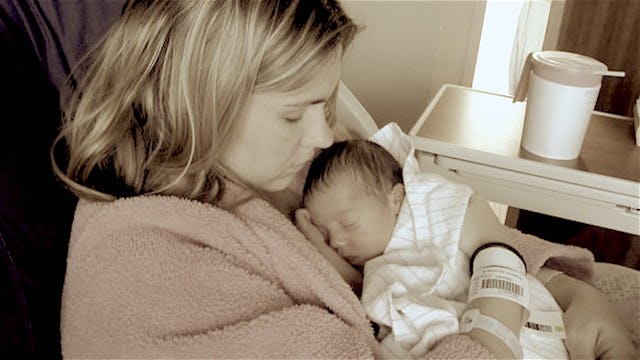Please Stop Telling Me I Did Something Wrong With Breastfeeding

Breastfeeding was difficult for me. It hurt like a bitch, it didn’t feel natural, and I struggled constantly with low supply. It was a herculean feat to get a couple of ounces into my baby who really wanted at least 4 ounces. I tried all the things. I ate well, I drank plenty of water (but not too much because that’s bad too!), I fed on demand, I used various compresses and massaged my breasts during feeding to encourage letdown. I saw multiple lactation consultants who assured me my son’s latch was perfect and that, for some women, breastfeeding just hurts.
After weeks of having my son attached to me literally around the clock, my nipples cracked and bleeding and my head and heart aching from listening to him cry because he wasn’t getting enough, I finally gave in and made him a bottle of formula. I know now that it doesn’t really matter that I gave him the damn bottle of formula. I know I didn’t fail my child or myself.
And yet, to this day, whenever breastfeeding comes up and I share my story, well-meaning folks will still run down the list of things I may have done wrong. This drives me bat-shit bonkers for a few reasons.
One, I can’t go back and redo breastfeeding, so even if someone were to suggest the one thing I didn’t try but would have solved all my problems, well, it’s too fucking late. So now I just feel like shit for somehow having missed a vital piece of information even though I tried really hard and did everything the experts said to.
And two—and this is the one that really drives me nuts—there is an insinuation that if you struggled with breastfeeding, you must have been doing something wrong. Even if they don’t mean to imply this, when people start retrospectively diagnosing issues I may have had or suggesting techniques I should have tried, the implication is still that I didn’t do enough. The assumption is that it was a failure on my part rather than a simple difference in my body’s biology.
In the little circle of new moms I inhabited, other moms breastfed like it was second nature. Yes, some also struggled like me, but there were quite a few for whom breastfeeding was akin to a religious experience. They ate whatever the fuck they wanted and didn’t obsess over their water intake, didn’t have nipple pain or trouble letting down, and had so much supply that after an hour they were literally spurting milk from their nipples and soaking the fronts of their shirts. They’d strap their babe on and stick a boob in their mouth and carry on with their day without a second thought.
Meanwhile, there I was structuring every waking moment (and even most of my sleeping ones) around my damn boobs, deep breathing and trying to relax because “stress impacts milk supply,” and I just never produced enough.
I’m sure I was just doing it wrong.
Can we maybe admit that breastfeeding bodies are not all the same? This is painfully obvious to me, and yet I still get the ol’ “did you try…?” line whenever I admit my struggles with breastfeeding. The fact is, some women do absolutely nothing different with their lifestyle and breastfeed with no problem whatsoever, and other women, like me, manage it but not without loads of agony and heartache. Still others desperately desire to breastfeed and follow every grain of expert advice given to them, but, for whatever reason, their body won’t cooperate.
Knowing these differences exist should be enough indication that bodies vary in how much milk they produce. We need to acknowledge that some breasts simply produce less, and that’s that.
So if you had a reasonably easy time with breastfeeding, please understand that you are lucky. Please, when your friend tells you she has low supply and has tried everything, unless she is specifically asking for help, don’t invalidate her pain by suggesting a bunch of ideas that imply she’s not doing enough. Especially don’t do this to any woman who is sharing her struggles with breastfeeding but who is no longer breastfeeding. I guarantee you, the frustration she experienced during that struggle is something she still carries with her.
I knew all of the benefits of breastmilk, and I really wanted to breastfeed exclusively. I did breastfed both of my kids, one for 13 months and the other for 10, but I had to supplement a bottle of formula once per day. Even with all the interventions, I never produced enough. I’m not mad about this in the least. I have zero regrets, and I harbor no resentment over the fact that I had to supplement. I am incredibly grateful I was able to breastfeed at all and that formula was an option.
My problem is that whenever this topic comes up, whether it’s my own story or one I’m witnessing unfold in person or on social media, invariably a well-meaning person whose advice was not solicited pipes in with a bunch of potential mistakes that may have been made.
Feeding our babies is such a sensitive topic, and not just in the sense that it’s divisive. It’s sensitive in the sense that we are biologically programmed to be anxious about how we keep our offspring alive. It’s a bone-deep, gut-wrenching, genetically sanctioned fretfulness.
It’s one thing to advocate for the breastfeeding and list the well-substantiated benefits of breast milk, but we need to be aware of the potential sensitivities and refrain from doling out unsolicited advice and retroactive criticism. Unless a mother is harming her baby with what she feeds them, and unless she is specifically asking for guidance, the only thing we need to be telling each other is, “You did an awesome job, Mama.”
This article was originally published on